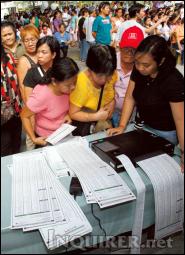MANILA, Philippines–Amid concerns raised over the use of poll automation again in the 2016 elections, a civil society group has claimed that the automated election system (AES) has reinstilled integrity in the election process.
“Our experience in 2013 was successful in reinstilling integrity in the election process. The results were reliable, efficient and swift,” Democracy Watch’s Tim Abejo said in a statement.
The group assailed the critics of poll automation who are proposing a return to manual elections in 2016, saying the “regression” will only benefit election operators and cheaters.
The AES replaced the old system of manual voting and canvassing, which history has shown to be prone to cheating, Abejo said.
However, the critics of poll automation have been questioning the credibility of the results as the actual counting of votes and the canvassing process take place electronically and thus invisible to the naked eye.
Abejo said all that is needed is to provide additional safeguards to improve the implementation of the process.
The group suggested a more stringent source code review, expanded random manual audits, the upgrading of Comelec infrastructure and training of employees.
A legal framework also needs to be put in place in case the manual audit reveals unacceptable discrepancies, Abejo said.
Democracy Watch said it was supporting the Comelec’s move to increase the number of precinct count optical scan (PCOS) machines as a practical step to address the congestion in some clustered precincts.
Not PCOS-related
Abejo noted that the reported problems in the two previous poll exercises were mainly due to issues not associated directly with the PCOS machines, but problems with the voters’ lists, the board of election inspectors, among others issues.
Meanwhile, poll watchdog AES Watch which is opposing the reuse of the old PCOs machines and the purchase of additional units is also opposing the Comelec plan to pilot-test new voting technologies in the 2016 polls, particularly the use of the touchscreen technology called direct recording electronic (DRE).
The Comelec is set to pilot-test the DRE in highly urbanized areas and Internet voting for overseas Filipinos in the 2016 polls.
Touchscreen voting technology would leave the voter without any way of knowing whether his vote would be accurately counted, said Augusto Lagman, a former election commissioner who is now one of the AES Watch leaders.
The DRE uses touchscreen or touchpad technology and is fully automated from voting to counting and final transmission of results to the canvassing centers at the provincial and regional levels.
Lagman also clarified that “we’re not pushing for a return to manual elections.”
“What we’re saying is automate the canvassing because that’s where the problem is. That’s where the dagdag-bawas (vote-padding and shaving) happens, not in the precinct level,” he explained.
Meanwhile, critics of the AES have raised the likelihood of a huge payoff to top Comelec officials from service provider Smartmatic in the bidding for P2-billion worth of additional voting machines.
“For sure there will be bribery if Smartmatic is allowed to enter the new bidding,” warned retired Dagupan-Lingayan Archbishop Oscar Cruz.
The public should “closely monitor the bidding process… If Smartmatic wins again, something fishy happened,” he said.
Shameless
Cruz also assailed Comelec Chair Sixto Brillantes Jr. for allegedly acting like the Smartmatic spokesperson, saying the head of the poll body was “shameless” in his consistent defense of Smartmatic.
“When we’re both no longer in this world and we bump into each [other] in heaven, I will promptly quit heaven,” he said.
Lagman wondered why Brillantes “seems to be in a big hurry to hold the bidding for the new PCOS machines before he retires in early February.”
“Why indeed! Could it be because billions of pesos are involved?” he said.
He said it would not be too late to wait for Brillantes’ successor to be in place before undertaking the bidding which he said could wait till mid-2015.
Smartmatic president Cesar Flores dismissed as “nuisance” and “recycled” the criticisms thrown at his company by what he called “dubious groups.”
In a statement, he expressed confidence that the firm could “provide the best services, such as maintenance, upgrade and refurbishing” of the Comelec’s PCOS machines.
Helen Flores, the chair of the Comelec bids and awards committee, said the committee could not ban Smartmatic from joining the bidding without a directive from the poll body or the Supreme Court.
